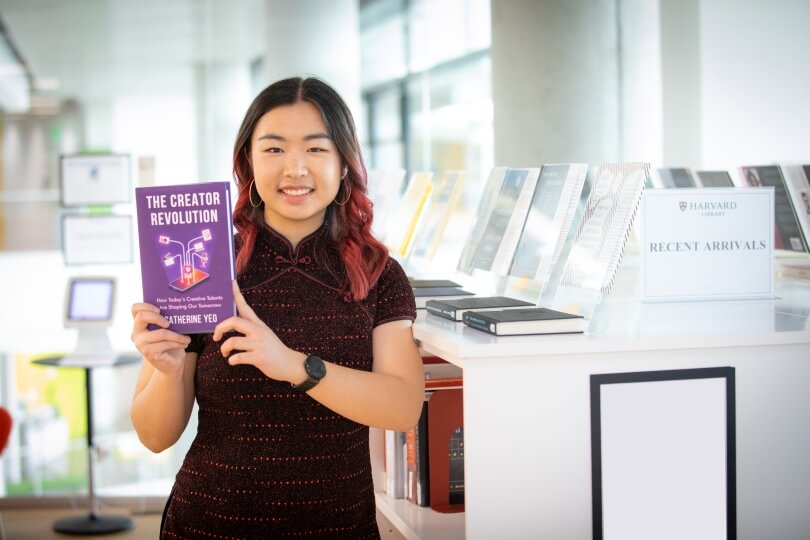Catherine Yeo, A.B. '23 in computer science, with her book, "The Creator Revolution: How Today’s Creative Talents Are Shaping Our Tomorrow" (Eliza Grinnell/SEAS)
When the COVID-19 pandemic forced students around the country to switch to remote classes, Catherine Yeo found herself in a familiar place. She’d attended an online high school in the San Francisco Bay Area before arriving at Harvard, and her experiences as an online content creator taught her a lot about building a community in a virtual space.
“I grew up a huge nerd and wrote a lot of ‘Harry Potter’ and ‘Star Wars’ fanfiction when I was younger,” said Yeo, who will graduate with degrees in Computer Science from the Harvard John A. Paulson School of Engineering and Applied Science (SEAS) and English. “As I started to grow my audience, publishing my fiction and art to an audience of hundreds of thousands, that turned into a business.”
The pandemic not only forced everyone online, it also limited access to traditional media. As theaters shut down and production schedules lengthened, there were fewer movies and television shows to watch. That led to a large increase in online content creators, with some studies showing as many as 50 million creators across a range of social media platforms and websites.
“When we think of creators, often we just think of a YouTuber or a TikTok dancer,” Yeo said. “But creators come from all kinds of niches, including educators, activists, filmmakers and writers.”
Yeo decided to document the rise of online content creators in her book, “The Creator Revolution: How Today’s Creative Talents Are Shaping Our Tomorrow.” It was published in May 2022 and immediately took off, ranking first in several categories on Amazon in its first month.
“The first month was a roller coaster of emotions,” Yeo said. “I was relieved and excited to put this work out into the world, but also really nervous about how it would be received. People close to me had read snippets, but not the book in its entirety. It was an intensely long journey, but overall, I was really excited to hear what people had to say about it and how they responded to it.”
Writing and publishing a book is the longest project Yeo has ever undertaken. It started with interviewing hundreds of creators, followed by multiple rounds of writing, editing and rewriting. Even after publication, Yeo would give talks and online interviews to promote the book, all while completing her coursework at Harvard.
“The process never ends, but I find it really fun,” Yeo said. “I’ve given talks for younger audiences about the good and bad of social media and talks more on the technological or entrepreneurial sides of being a creator. I do hear from a lot of people who were on the fence, who admired a lot of creators but were too scared to take a stab at it. I’m really glad my book could inspire them to at least give it a try.”
A passion for writing turned Yeo into a content creator, but it also led to her interest in computer science. She first learned to code for a website to help her high school classmates improve their vocabulary. She soon found parallels between coding and writing.
“Both are a process of turning an idea into something more tangible,” Yeo said. “You start with a blank slate in both instances, and it’s up to you and your creativity to turn it into something more structured that can be communicated for other people to read or use.”
As a computer science concentrator at SEAS, Catherine Yeo has directed multiple hackathons and written a bestselling book on the rise of online content creators. (Eliza Grinnell, SEAS)
Yeo’s time at Harvard reflects her dual passions. On the writing side, she’s been part of the Harvard College Stand-Up Comedy Society, “Satire V” humor publication, and Tuesday Literary Magazine. For computer science, she’s directed the hackathons HackHarvard and IvyHacks, and been a teaching fellow in the inaugural offering of CS96R: Machine Learning for Social Good. She recently combined her writing and computer science skills by organizing and performing a set at a tech-themed stand-up comedy show at SEAS.
Yeo is also a member of the Undergraduate Technology Innovation Fellows Program, a program run jointly by SEAS and Harvard Business School. She co-founded a start-up during the pandemic, which offered a “digital dorm room” where students could socialize together online. The start-up didn’t last past 2021, but upon her return to campus Yeo wanted to learn more about entrepreneurship.
“I knew I wanted to be a founder again down the line,” Yeo said. “When I came back and joined the Tech Innovation Fellowship, I was super grateful for what it had to offer me.”
That entrepreneurial education could pay off for Yeo following graduation. She’ll be joining a start-up called Warp, whose programming terminal uses AI to improve the user experience for developers. Yeo also plans to continue performing stand-up comedy and return to the writer’s desk at some point.
“It’s a really big goal of mine to keep democratizing access and making things more accessible,” she said. “Having been a developer for a long time, I'm excited to help build a more accessible terminal. My book sought to democratize the world of content creation. This won’t be my last book, but it’ll be my only book for a bit.”
Press Contact
Matt Goisman | mgoisman@g.harvard.edu

